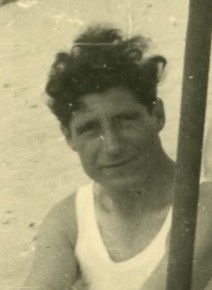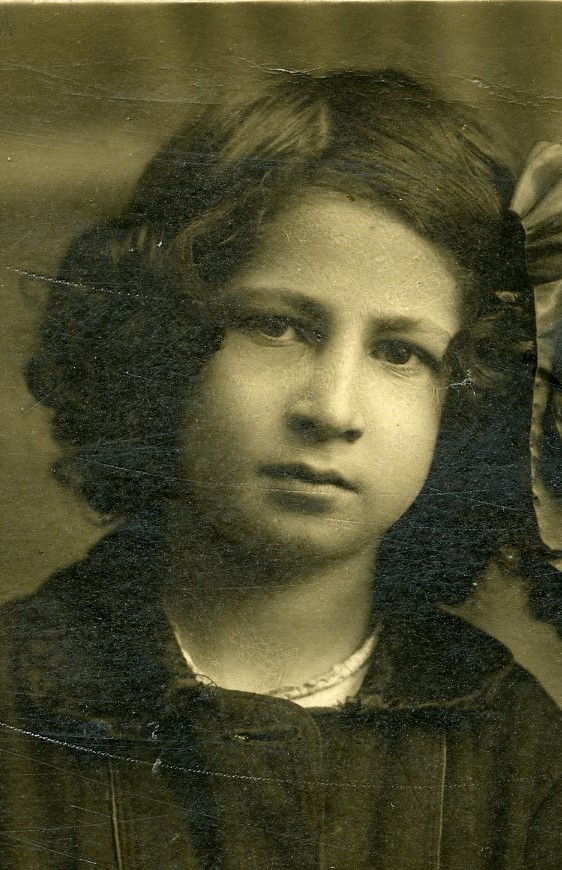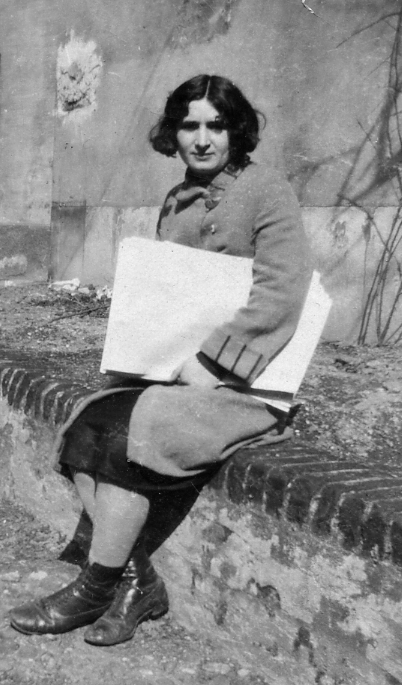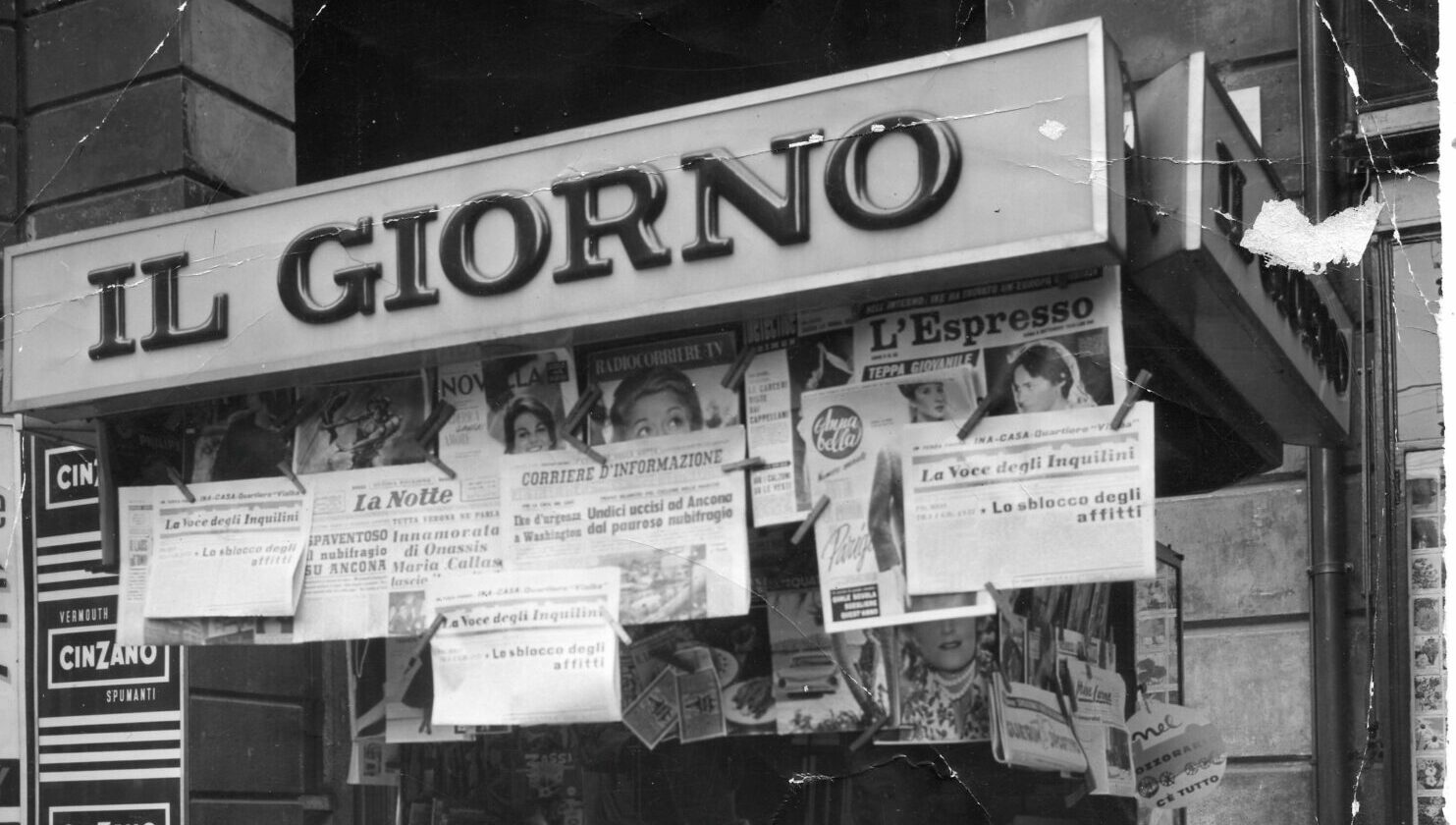Read more:
† 20.05.2003 in Milan
Nationality at birth: Italian
Nationality at death: Italian
Modesto Lorenzo
Maria Emilia Motta
 Brother
Brother
Modesto Lorenzo
* 24.04.1919 Sister
Sister
Tina
Erminio Pricchi
Marina Farvo
Place of the fight for human rights: Milan
Right to life, freedom and security
Freedom of expression
Right to truth

INTRODUCTION
Her identity card, renewed on 18 June 2002 had her recorded as Agostina Farvo, born in Milan on 24 March 1912 (to Modesto Lorenzo and Maria Emilia Motta), living in Milan at No 1, Via Passaggio degli Osii, profession pensioner, civil status FREE! To all of us and more besides she was not Agostina but Augusta, the doyenne of Milan’s anarchists, a partisan and kiosk-holder in the Via Orefici right in he heart of the city, formerly the wife of Erminio Pricchi (the marriage did not last long). Her kiosk was to serve as an essential rendezvous point for Milan anarchists after the Second World War, a sound, safe place for contacts, appointments and meets.
“Nonna d’amore e d’anarchia” – grandmother of love and anarchy – was the name Augusta Farvo was known by among her friends and comrades.
THE STORY
Childhood

Augusta Farvo (right) with her older sister Tina. (CC BY-NC) Marina Farvo / Centro Studi Libertari – Archivio Giuseppe Pinelli
Augusta Farvo had an older sister, Tina, seen in the photograph on the left from the 1910s (Augusta shown on the right), plus a brother, Modesto Lorenzo, born in Milan on 24 April 1919.
She was a straightforward, free, self-educated woman with a passionate interest in politics and playing cards (a game from which she always emerged victorious), she was open to ideas and communicative. Augusta was held in high esteem by people of all persuasions, including Sandro Pertini, Italian president in the early eighties and active in the fight against fascism.
Even though she was a teacher, she opted not to teach, least she be obliged to mislead the kids by regaling them with the lies of the fascist powers that be; and besides she decided to not have any children herself because – this was back in the days of mandatory conscription in Italy – she had no desire to supply cannon-fodder to the state.
Partisan and Newsagent
Between 1943 and 1945 she was active in the Bruzzi-Malatesta Brigades, an anarchist group of partisans who resisted the fascist regime under Benito Mussolini. Farvo made it her primary mission to save the lives of comrades (including communists and anarchists) by hiding them in her own home during the most dramatic moments in the partisan struggle.
After the war, her home became the base to two groups – one an Esperantist group, the other an anarchist group – and her kiosk became a rallying point for the Milan anarchists (especially during the years when they had no premises of their own, namely, between the mid-1950s and about the mid-1960s). Her kiosk was a place where they could find the libertarian press, including international publications. Augusta’s home was always open and welcoming to those in need of assistance; a rendezvous point, meeting place and reference point. In the 1950s she welcomed Spanish anti-Francoist exiles such as Josep Lluis Facerías (1920-1957) and then, in the 1960s upcoming generations of anarchists.

Augusta Farvo’s legendary kiosk in Milan, photograph taken in 1959. (CC BY-NC) Marina Farvo / Centro Studi Libertari – Archivio Giuseppe Pinelli

The beach in Cecina, 1953: Augusta in the middle, surrounded by friends and family members. On the far left: Her brother Modesto. (CC BY-NC) Marina Farvo / Centro Studi Libertari – Archivio Giuseppe Pinelli
The events after the Piazza Fontana bombing
On December 12, 1969, a bomb attack took place in Milan’s Piazza Fontana, killing 17 people and injuring over 80, some of them seriously. After this bombing, Augusta Farvo was at the centre of the storm that affected all libertarians as they were unfairly accused of having planted that deadly bomb, not least because friends of hers – Giuseppe Pinelli and Pietro Valpreda – were accused by the police as having been behind the bombing. Once again Augusta’s home became a rallying point for all sorts of initiatives linked to the massive counter-information drive regarding the strage di stato (state massacre), not least on the part of the Milan groups linked to the Circolo Ponte della Ghisolfa and the Bandiera Nera (Black Flag) group, Pinelli’s group.
Together with Fernando Del Grosso, Augusta Farvo went to embark upon a hunger strike in Rome (in Porta San Giovanni) from 13 to 20 October 1971 to press for a date finally to be set for the trial of the comrades indicted over the Piazza Fontana bombing on December 12, 1969. Once the state was forced to pass a law (which soon became known as the ‘Valpreda Law’) to release the unjustly detained comrades, it was to be Augusta who played host to Pietro Valpreda in Milan, in her home in the Passaggio Osii, right above her historical kiosk, enduring the daily presence of the police personnel charged with keeping an eye on the one-time “monster”, Valpreda.
Death
Augusta Farvo died in Milan on May 20, 2003. She was laid to rest to the sounds of the song “Addio a Lugano” by Pietro Gori, covered by a red and black flag. The press reported her death as that of “l’ultima partigiana anarchica”, the last anarchist partisan.

Augusta Farvo in an undated photograph. (CC BY-NC) Marina Farvo / Centro Studi Libertari – Archivio Giuseppe Pinelli
Author: Lorenzo Pezzica (translated into English by Paul Sharkey), edited by Magdalena Köhler.
Originally published in the magazine of Centro Studi Libertari/Archivio Giuseppe Pinelli: Bollettino n. 54 dell’Archivio G. Pinelli; pp. 48-51 (in Italian), the english translation was published in the Kate Sharpley Library (https://www.katesharpleylibrary.net/t76k8n).
Sources:
Anteo. “Ricordando… Augusta Farvo”, in: Umanità Nova n. 23, 22.06.2003. http://www.ecn.org/uenne/archivio/archivio2003/un23/art2794.html, last retrieved on 24.02.2023.
Fallisi, Joe. “Ciao Augustina!”, in: Arivista anarchica, 33/292, 2003. http://www.arivista.org/?nr=292&pag=58.htm, last retrieved on 23.02.2023.
Pezzica, Lorenzo. “Augusta Farvo, partigiana ed edicolante.”, in: Bollettino Archivio G. Pinelli, No 54, February 2019, p. 48-51. https://centrostudilibertari.it/sites/default/files/materiali/bollettino_54.pdf, last retrieved on 23.02.2023.
Pezzica, Lorenzo. “Augusta Farvo, Partisan and Kiosk Operative.“, transl. by Paul Sharkey, in: Kate Sharpley Library. https://www.katesharpleylibrary.net/t76k8n, last retrieved 07.03.2023.
Schirone, Franco. “FARVO, Augusta”, in: Biblioteca Franco Seratini, https://www.bfscollezionidigitali.org/entita/15060-farvo-augusta, last retrieved on 23.02.2023.
Working Class History. “Augusta Farvo born”. https://stories.workingclasshistory.com/article/9672/augusta-farvo-born, last retrieved on 24.02.2023.
Contact: info@buxus-stiftung.de






